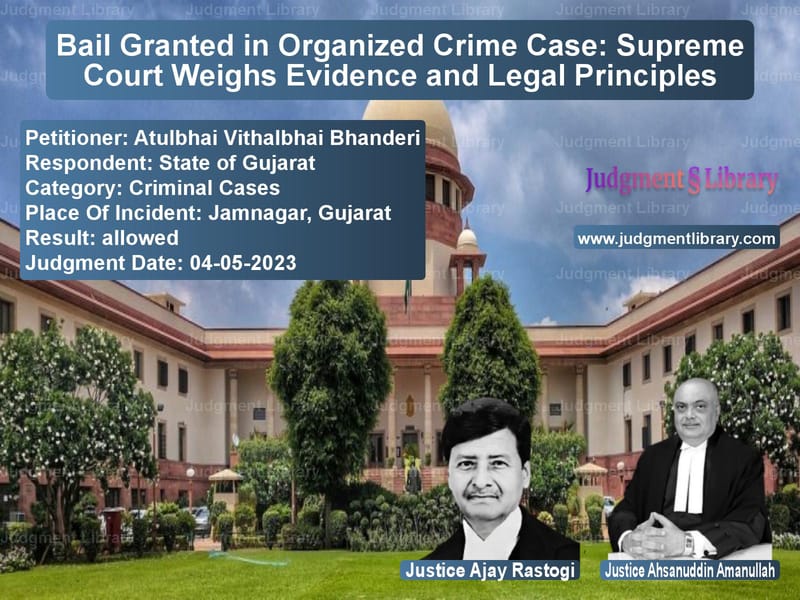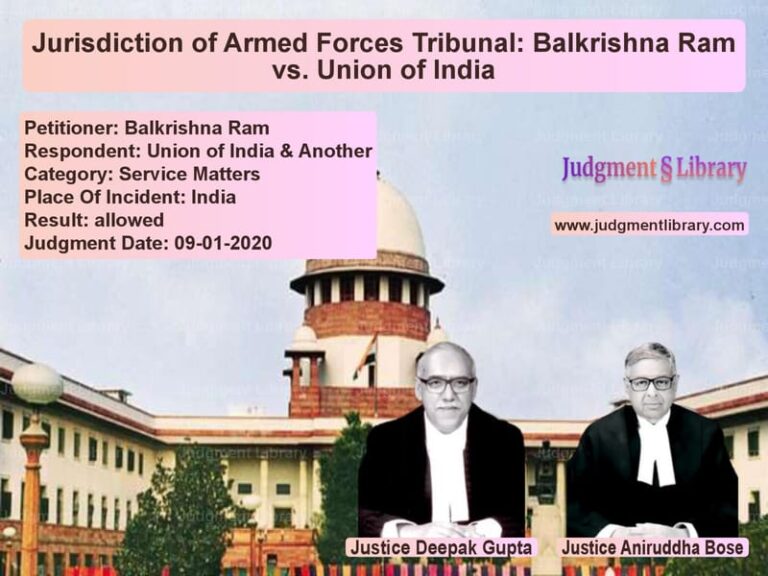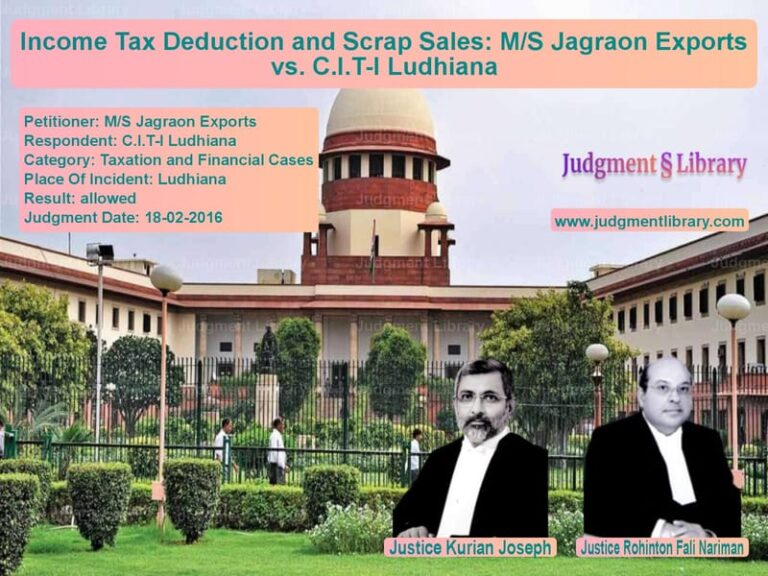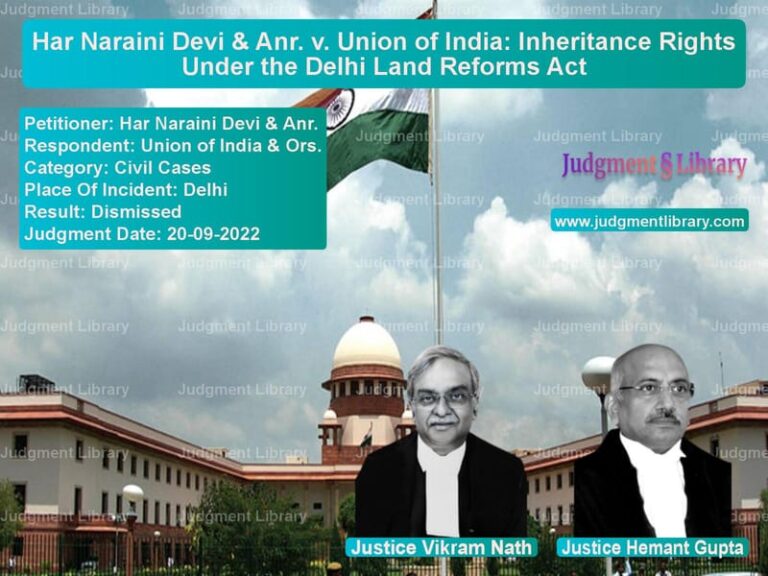Bail Granted in Organized Crime Case: Supreme Court Weighs Evidence and Legal Principles
The case of Atulbhai Vithalbhai Bhanderi vs. State of Gujarat revolves around a petition for bail in a case involving allegations under the Gujarat Control of Terrorism and Organized Crime Act, 2015 (GCTOC Act). The appellant was accused of being part of an organized crime syndicate involved in extortion and land-grabbing. The Supreme Court’s ruling in this case provides a critical examination of the principles governing bail in cases of organized crime.
Background of the Case
The appellant was accused in FIR No. I-11202008202186 of 2020, registered at the ‘A’ Division Police Station, Jamnagar, under various sections of the GCTOC Act and the Indian Penal Code (IPC), including:
- Sections 3(1), 3(2), 3(3), 3(4), and 3(5) of the GCTOC Act
- Sections 384, 385, 386, 387, 506(1), 506(2), 507, 201, and 120B of the IPC
According to the prosecution, the appellant was involved in intimidating victims to either cancel a land deal or pay an extortion sum of Rs. 1 crore. The primary accused, Jaysukh @ Jayesh Muljibhai Ranpara (Patel), was alleged to be the leader of an organized crime syndicate that had 59 cases registered against him.
Petitioner’s Arguments
The appellant, through his counsel, contended:
- He was wrongly implicated, with no evidence proving his involvement in an organized crime syndicate.
- Eight other cases had been registered against him, but seven of them were prior to 2015 and were unrelated to organized crime.
- The last case against him was from 2019, before the GCTOC Act came into force in Gujarat.
- The prosecution’s case relied on a telephonic conversation where the appellant allegedly facilitated a meeting between the complainant and the main accused, but witnesses later denied his involvement.
- Six co-accused had already been granted bail.
Respondent’s Arguments
The State, represented by the Additional Solicitor General, argued:
- The appellant was closely associated with the main accused and played an active role in the organized crime syndicate.
- The appellant had facilitated meetings to extort money and was involved in land-grabbing operations.
- After his arrest, his son continued to be involved in extortion activities.
- The prosecution had witness statements directly linking the appellant to the crime.
- The appellant should not be granted bail until key witnesses had testified.
Supreme Court’s Observations
The Court examined the evidence and legal principles governing bail and made the following key observations:
- Bail is a matter of judicial discretion that must be exercised judiciously, keeping in mind the gravity of the offense and the likelihood of tampering with evidence.
- The presence of previous cases against the appellant does not automatically establish his involvement in organized crime.
- The prosecution failed to show a pattern of continued unlawful activity as required under the GCTOC Act.
- Although the prosecution argued that the appellant was part of an organized crime syndicate, the Court found that the evidence presented did not conclusively establish this claim.
Key Judgment Excerpt
The Court observed:
“Had there been no other case against the Appellant and no material, at least prima facie, to indicate his regular participation in any crime, the Court could have considered his prayer, but keeping in view his alleged role, we are not inclined to exercise discretion in his favor for now.”
The Court further noted:
“In deciding the aspect of parity, the role attached to the accused, their position in relation to the incident and to the victims is of utmost importance. The High Court has proceeded on the basis of parity on a simplistic assessment, which again cannot pass muster under the law.”
Final Verdict
The Supreme Court granted bail to the appellant, subject to the following conditions:
- The appellant must report to the investigating officer every Monday.
- The appellant must provide an undertaking of good behavior.
- The appellant must not attempt to influence witnesses or tamper with evidence.
- The appellant must surrender his passport.
The Court emphasized that any violation of these conditions would allow the prosecution to seek cancellation of bail. This ruling reinforces the principle that bail should not be denied merely on the basis of multiple FIRs if a clear pattern of organized crime is not established.
Petitioner Name: Atulbhai Vithalbhai Bhanderi.Respondent Name: State of Gujarat.Judgment By: Justice Ajay Rastogi, Justice Ahsanuddin Amanullah.Place Of Incident: Jamnagar, Gujarat.Judgment Date: 04-05-2023.
Don’t miss out on the full details! Download the complete judgment in PDF format below and gain valuable insights instantly!
Download Judgment: atulbhai-vithalbhai-vs-state-of-gujarat-supreme-court-of-india-judgment-dated-04-05-2023.pdf
Directly Download Judgment: Directly download this Judgment
See all petitions in Extortion and Blackmail
See all petitions in Fraud and Forgery
See all petitions in Bail and Anticipatory Bail
See all petitions in Judgment by Ajay Rastogi
See all petitions in Judgment by Ahsanuddin Amanullah
See all petitions in allowed
See all petitions in supreme court of India judgments May 2023
See all petitions in 2023 judgments
See all posts in Criminal Cases Category
See all allowed petitions in Criminal Cases Category
See all Dismissed petitions in Criminal Cases Category
See all partially allowed petitions in Criminal Cases Category







